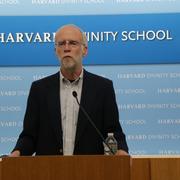
The last of our five faculty book events of the semester took place on Monday, April 20 at 5:15 in the Sperry Room at Harvard Divinity School. This event highlighted His Hiding Place Is Darkness: A Hindu-Catholic Theopoetics of Divine Absence (Stanford University Press, 2014) by Professor Francis X. Clooney, S.J. (Parkman Professor of Divinity, Professor of Comparative Theology and Director of the Center for the Study of World Religions). This is the latest of Professor Clooney’s impressive list of publications in comparative theology. In this scholarly and poetic work, Professor Clooney explores the absence of the beloved in a new reading of the biblical Song of Songs (Shir ha-Shirim) and the Hindu Holy Word of Mouth (Tiruvaymoli), in light of traditional commentaries in the Catholic and Srivaisnava Hindu traditions. His Hiding Place is Darkness explores the uncertainties of faith and love in a pluralistic age.
The discussants were Catherine Cornille ( Professor, Chairperson of the Theology Department and Newton College Alumnae Chair of Western Culture at Boston College) and Kimberley C. Patton (Professor of the Comparative and Historical Study of Religion at HDS) The panel was moderated by Kevin J. Madigan, Winn Professor of Ecclesiastical History at HDS. They opened up Clooney’s rich work in different ways in accord with their different approaches to comparative theology and explored the intensity and self-revelatory aspects of this work. Cornille spoke of this book as a theology of religions and a work of pastoral theology. She posed interesting questions about the place of the comparative theologian in the academy. Patton in her own poetic response to the book spoke of the intensity of this book and the dangers inherent in the lethal loss of love. She states that, “Clooney’s book will not allow you to retreat from this danger but invites you into the danger as “Loving God is always a risk.” The general discussion that followed allowed for further conversation about the personal aspects of writing the book and how it might be received by different readers.
—By Corey O'Brien, Associate Director of the Center for the Study of World Religions
